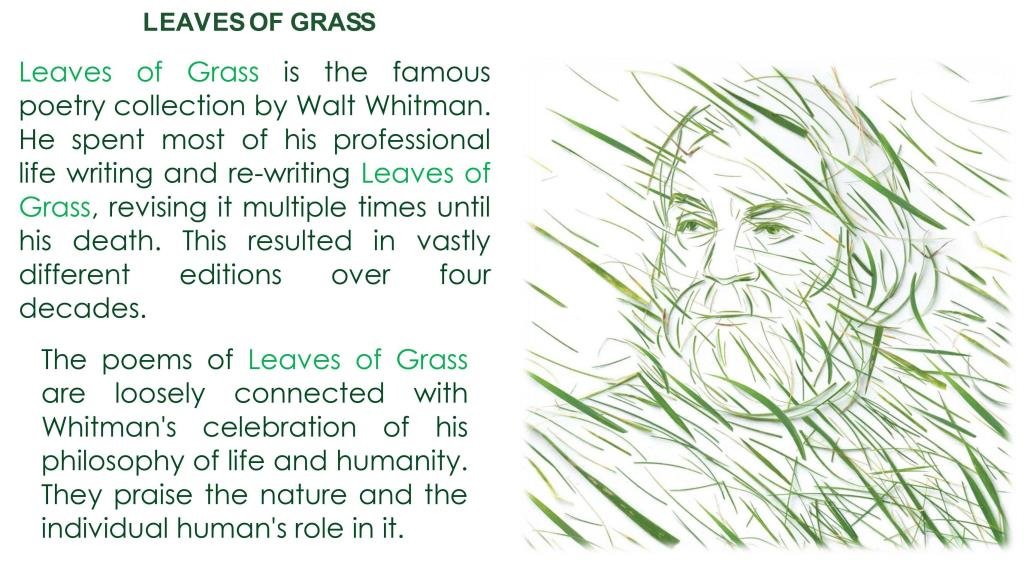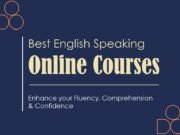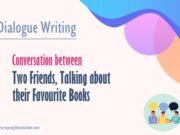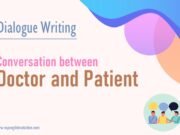2.1: ‘Song of the Open Road’
Maharashtra State Board
Class 12, English

Walt Whitman
- Walt Whitman, an iconic figure in American literature, was a 19th-century poet, essayist, and journalist renowned for his groundbreaking work, “Leaves of Grass.”
- Born on May 31, 1819, in West Hills, New York, Whitman is often celebrated as the father of free verse poetry, pioneering a style that broke away from traditional meter and rhyme.
- His work captures the spirit of democracy, individuality, and the interconnectedness of humanity and nature.
- Whitman’s poetry reflects his deep humanism and inclusivity, exploring themes of love, death, and the human experience in a candid and expansive manner.
- His contributions significantly influenced subsequent generations of poets and writers, cementing his legacy as a central figure in the American literary canon.


Song of the Open Road
Song of the Open Road is a joyful and inspiring poem by Walt Whitman, found in his famous book “Leaves of Grass.” Written in 1856, the poem encourages readers to embrace life’s journey with excitement and an open mind. Whitman talks about the freedom of traveling the open road, meeting new people, and experiencing new things. He believes that life is full of possibilities and that everyone should take the opportunity to explore and grow. The poem’s simple language and vivid descriptions reflect Whitman’s love for nature and his optimistic view of the world, making it a timeless celebration of adventure and self-discovery.

‘मुक्त रस्त्यावरील गीत’ (Song of the Open Road) ही कवी वॉल्ट व्हीटमॅन यांच्या ‘गवताची पाने’ (Leaves of Grass) या कवितासंग्रहातील एक अतिशय सुंदर कविता आहे. हे एक ‘मुक्त काव्य’ असून यामध्ये व्यक्तीच्या ठिकाणी असलेल्या आत्मजागृती, मुक्त ईच्छाशक्ती व हृदयाच्या कोमलतेचा सुंदर असा मिलाप दिसून येतो. कुठल्याही शाळेत किंवा विद्यापीठात अनुभवायला न मिळणारा विवेक जीवनरूपी प्रवासात अनुभवला जातो.
कवितेतील रस्ता हा मानवी गतीमानशीलतेचे प्रतिक आहे. गरीब-श्रीमंत, स्त्री-पुरुष असा कुठलाही भेद न करता असंख्य लोकांना हा रस्ता मार्गक्रमित करत असतो. नवनवीन ध्येये व स्वप्ने उराशी बाळगलेल्या सर्वांनाच प्रचंड अत्माविश्वासाने हा रस्ता पुढे पुढे नेत असतो. कवितेमध्ये व्यक्ती व त्याच्या वास्तव्याचे मार्मिक वर्णन केले आहे. जीवनरूपी या प्रवासात, मानसन्मानाच्या या विश्वात एकाच ठिकाणी दीर्घकाळ गुरफटत राहणे कवीला बिलकुल मान्य नाही.
मानवी जीवनाच्या सर्वंकष मुल्यांचा स्पर्श असलेली हि कविता सर्वांगाने अतिशय प्रेरणादायी आहे. संघर्षमय अशा जीवनामध्ये धैर्याने जगण्याची गुरुकिल्ली निश्चितच या कवितेतून मिळते. जीवनरूपी प्रवासातला प्रत्येक क्षण आनंदाने जगण्याचा मूलमंत्र या कवितेत दिलेला आहे. कवितेतील निवेदक हे भौतिक सुखाच्या सुरवातीपासूनच दूर आहे. ज्ञान व विवेक हीच खरी माणसाची संपत्ती आहे, हेच मानवी जीवनाचे खरे तत्वज्ञान आहे.
जीवनरूपी प्रवासामध्ये मानव हा एक प्रवासी आहे. कुठल्या दिशेने व कसा प्रवास करायचा याचा सर्वंकष विचार ज्याने त्याने करायचा आहे, मार्ग हा सर्वांसाठी खुला आहे. सभोवतालचे जग हे अतिशय सुंदर व निरोगी आहे. हे सर्व अनुभवण्यासाठी गरज आहे ती फक्त तुमच्या अंगी असणाऱ्या जिद्द, चिकाटी व आत्मविश्वासाची. तुम्ही जिकडे जाल तिकडे हा रस्ता तुम्हाला घेऊन जाईल. निर्णय तुम्हाला घ्यायचाय. सांभाळून चला नाहीतर भरकटायला वेळ लागणार नाही!
कवितेतील निवेदक म्हणतात कि मला नशिबाची वाट पाहत एका ठिकाणी रेंगाळत बसायचे नाही. माझ्या सामर्थ्यावर माझा प्रचंड विश्वास आहे व याच विश्वासाच्या जोरावर मला माझे नशीब स्वतःच घडवायचे आहे. हुंदके देण्यापेक्षा व संकोच बाळगण्यापेक्षा माझ्या भाग्याचा शिल्पकार मला स्वतःच बनायचे आहे, तेवढे स्वातंत्र्य व तेवढा आत्मविश्वास निश्चितच माझ्यामध्ये आहे.
निवेदक पुढे म्हणतात की जीवनामध्ये मी प्रचंड घाव सोसले आहे. वैफल्यग्रस्त मनोवृत्ती, निंदानालस्ती व अंतर्गत वेदना ह्या सर्व गोष्टी मी सहन करत आलो आहे. मी स्वतःला प्रचंड सावरले आहे. आता मी इतका खंबीर व समाधानी बनलो आहे कि मला इकडे तिकडे पाहण्याची गरजही नाही व वेळही नाही. आता फक्त एकच ध्येय आहे ते म्हणजे या जीवनरुपी मार्गावरील प्रामाणिक प्रवासी म्हणून मार्गक्रमण करत राहणे.
कवितेतील निवेदक पुढे म्हणतात कि ग्रहतारे, कुंडली व नशिब यासारख्या गोष्टींवर माझा विश्वास नाही. ज्यांना कुणाला अशा गोष्टींची गरज असेल तर असू द्या, परंतु माझ्यासाठी हे बिलकुलच गरजेचे नाही. जीवन जगण्याचा माझा मार्ग हा जगावेगळा आहे, तितका मी स्वतंत्र व निर्णयक्षम आहे.
कवितेच्या शेवटी निवेदकाने आपण प्रचंड समस्यांनी ग्रासलेलो असल्याचे कबूल केले आहे. समस्यांचे हे ओझे सदैव माझ्यासोबत घेऊनच मी पुढे पुढे जात आहे. पळ न काढता या ओझ्यांसोबतच उर्वरित प्रवास मला करायचा आहे. मला जाणीव आहे कि या प्रवासात मी एकटा मुळीच नाही. माझ्यासारखे असंख्य स्त्री-पुरुष धैर्याने माझ्यासोबत मार्गक्रमण करत आहेत, जीवनातील खरा आनंद शोधत आहेत…

Poem
“Afoot and light-hearted I take to the open road,
Healthy, free, the world before me,
The long brown path before me leading wherever I choose.
Henceforth I ask not good-fortune, I myself am good-fortune,
Henceforth I whimper no more, postpone no more, need nothing,
Done with indoor complaints, libraries, querulous criticisms,
Strong and content I travel the open road.
The earth, that is sufficient,
I do not want the constellations any nearer,
I know they are very well where they are,
I know they suffice for those who belong to them.
(Still here I carry my old delicious burdens,
I carry them, men and women, I carry them with me wherever I go,
I swear it is impossible for me to get rid of them,
I am fill’d with them, and I will fill them in return.)”

ICE BREAKERS
Activity: Choose the mode of travel that you would like the most for a journey. Give reasons:


Activity: Discuss with your partner, the preparations you would like to make for the journey chosen:


Activity: Discuss the ways in which you would overcome the problems / hindrances/difficulties you face during your journey.


Activity: During every journey we have to observe certain rules. Discuss your ideas of the journey without any restrictions:
- I would go with my selected friends
- I would take care of old people
- I would not take selfie wherever not allowed
- I would protect the environment
- I would respect the customs and local traditions
- I would not hurt the animals
- I would change plans as new opportunities arise
- I would focus on experiences rather than material possessions
- I would build meaningful connections with fellow travelers and locals
- I would participate in communal activities and shared experiences

BRAINSTORMING
Activity: Pick out the lines showing that the poet is prepared to enjoy every moment of his journey:
- ‘Afoot and light-hearted I take to the open road.’
- ‘Healthy, free, the world before me.’
- ‘The long brown path before me leading wherever I choose.’
- ‘Strong and content I travel the open road.’
- ‘The earth, that is sufficient.’

Activity: By ‘old delicious burdens’ the poet means:
a. the luggage
b. the food he carries
c. the stress he bears during the travels
d. sweet memories of the past
Answer: Sweet memories of the past


Activity: The poet is a person who is free from all inhibitions. Discuss how the concept of ‘freedom’ is expressed in the poem:
The theme of this poem is freedom. The speaker describes himself as being “healthy and free.” He realizes he is the only person who is in complete control of his life. His freedom enabled him to choose his own destiny. He doesn’t need to pray for good fortune. He attests that he, himself, is his own good fortune. There is nothing that he is lacking because he’s free to get all. He will reach his destination on his own, and the earth will provide him with anything extra that is necessary.
The poem teaches the reader to be true to oneself and live a life of freedom like birds. The greatest joy in life is to live independently and freely. The poem begins in a very hopeful and idealistic tone. The narrator is setting off on his journey with free mind, without a care in the world.

Activity: Following are the activities of the poet related to his journey on the road. Divide them into two parts as ‘Activities, the poet will practice’ and ‘Activities, he will not practice’:
a. Walking along the road though he does not know where it reaches.
b. Complaining about the discomforts during the journey.
c. Postponing the journey.
d. Praying for good fortune.
e. Carrying the fond memories of the good people.
f. Creating contacts with famous and influential people.
g. Striving to achieve high and bright success.
h. Reflecting and developing his own ‘self’
| Activities the poet will practice | Activities he will not practice |
| Carrying the fond memories of the good people. | Walking along the road though he does not know where it reaches. |
| Creating contacts with famous and influential people. | Complaining about the discomforts during the journey. |
| Striving to achieve high and bright success. | Postponing the journey. |
| Reflecting and developing his own ‘self’ | Praying for good fortune. |

Activity: Write down the traits the poet exhibit through following lines:
- Henceforth, I ask for no good fortune- I myself am good fortune: Self-confidence
- Henceforth, I whimper no more, postpone no more, need nothing: Will-power, Persistence
- I do not want the constellations any nearer: Satisfaction, Fearlessness
- I swear it is impossible for me to get rid of them: Honesty, Acceptance
- I am filled with them- I will fill them in return: Capability, Hopefulness

Activity: Personal Response. ‘Healthy, free, the world before me’. Express your views regarding the above line:
The ‘journey’ in this poem is quite symbolic. This is the journey of Life. The speaker considers him healthy, both physically and mentally. He is quite free and able to do whatever he feels. He is the honest traveller in this democratic world. He is the creator and controller of his own fortune.

Activity: The poet has used many describing words such as ‘healthy’ in this poem. Make a list and classify them:


Activity: Figure of Speech-‘Paradox’
A Paradox is a figure of speech in which a statement appears to contradict itself. The opposite idea is given. The statement may appear to be silly or absurd, but in reality it contains a truth.
विरोधाभास म्हणजे असे विधान की ज्यामध्ये परस्पर विरोधी स्थिती दर्शविली जाते. असे विधान थोडे मूर्खपणाचे किंवा हास्यास्पद वाटते, परंतु ती वस्तुस्थितीच असते.
For Example: The words ‘old delicious burdens’.
A burden cannot be delicious. The poet has used this combination of words to express that he has many sweet memories of the people and places which he would like to remember forever. The poet has used seemingly contradictory expressions to convey the meaning that his heart is full of sweet memories of good and kind people. Though he wants to be free from any type of attachment, he wants to cherish these sweet memories in his heart forever.
This expression contains opposite ideas that make it seem absurd or unlikely, although it may be true. This is called ‘Paradox’.

Activity: Figure of Speech-‘Metaphor’
A metaphor is a figure of speech in which we find a comparison between two unrelated things. They are not similar but having something in common.
उपमेय आणि उपमान यांत एकरूपता आहे असे वर्णन असते तेथे रूपक अलंकार होतो. तसेच उपमेय आणि उपमान यात भेद नसून दोन्ही एकरूप आहेत असे येथे दर्शविले जाते.
For Example: The ‘road’ in the poem.
The road in the poem does not mean only the road to travel. The poet wants to suggest the road of life. This expression is called ‘Metaphor’.
The poet rightly described the ‘road’ as a ‘journey of life’. Road helps us to make our journey joyous and comfortable. Life is nothing but a long march, facing numbers of twists and turns, ups and downs. The road of life is very not easy to walk; numerous obstacles are there on its way. Life is beautiful like roses, living amidst the field of thorns. Only those people can make this journey successful who are really fearless, honest and capable.

Activity: Figure of Speech-‘Repetition’
There are certain words that are repeated in the poem. It is called Repetition. Repetition is a very common figure of speech in which the poet or the writer repeats the word or phrase two or more times in the same text, in order to highlight or emphasize the importance of the idea or feeling being expressed through the same.
In the poem Songs of the Open Road, certain words that are repeated. They are:
- ‘no more’
- ‘before me’
- ‘good fortune’
- ‘I carry’
- ‘fill them’
Effect on poem: Repetition is a very powerful tool to use in poetry. It is the soul of poetry. Repetition is repeating words, phrases, lines, or stanzas. Repetition helps to decorate the poem. It helps to emphasize the idea and creates a real rhythm. It also makes the poem interesting and active.

Activity: The use of personal pronoun ‘I’ is evident and prominent in this poem. Give reasons:
Personal Pronouns make the poem directly addressing and appealing the reader. Song of the Open Road is a perfect example with its skillful presence of Personal Pronouns.
- It directly connects the readers to the speaker and his personal life.
- It helps to know speaker’s capabilities and limitations very well.
- The use of Personal Pronoun highlights and proves the reality of speaker’s mood and his views towards life.

Activity: Write four to six lines of Free Verse on the topic ‘The Road that leads to my college’. Express that it is the road to knowledge and bright future. You may begin like this: ‘Every day I tread with the bag of books…’
“Every day I tread with the bag of books,
along the path where the morning light looks,
trees sway gently, guiding my way,
to a place where knowledge and dreams stay.
Steps on the road, familiar and true,
each day brings something fresh and new,
the road to my college, steady and bright,
leads me forward, with hope in sight.”

Activity: BLOG WRITING
A Blog is a regularly updated website or web page, typically run by an individual or small group.
- It is written in an informal or conversational style.
- Blog is an on-line journal, article or informational website.
- It displays information in the reverse chronological order.
- The latest posts appear first, at the top.
- It is a platform where a writer or a group of writers share their views on an individual subject.
‘ब्लॉग’ म्हणजे एखाद्या संकेतस्थळाचा नियमितपणे अद्ययावत केला जाणारा भाग. ज्यामध्ये उपयुक्त माहिती, बातम्या, मते, चित्रे, ध्वनी आणि ध्वनिचित्रफितींचा समावेश असतो.
Activity: Write a Blog on the topic ‘Man is free by Birth’


Activity: Expand the ideas suggested in the following lines:
All roads lead to Rome
The phrase “All roads lead to Rome” means that there are many different ways to achieve the same goal. In ancient times, Rome was the center of a vast empire, and the Romans built many roads that all connected back to their capital. This meant that no matter where you were in the empire, you could find a road that would eventually take you to Rome. The idea behind this saying is that there can be multiple paths or methods to reach the same destination or achieve the same outcome.
In a broader sense, this phrase teaches us that people can take different approaches and still end up in the same place. For example, if several people are working on the same project, they might have different ideas and strategies. Even though they work differently, they can all succeed in completing the project. This saying encourages us to be open-minded and recognize that different perspectives and methods can still lead to the same successful result. It reminds us that there is not always one right way to do something.
A man without liberty is a body without a soul
The phrase “A man without liberty is a body without a soul” means that freedom is crucial for a person’s true life and happiness. Just as a soul gives life and meaning to a body, liberty gives a person the ability to live fully and authentically. Without liberty, a person’s existence is limited and lacks true purpose. Freedom allows individuals to make their own choices, express themselves, and pursue their dreams. Without it, they are restricted and unable to live their lives to the fullest.
In a broader sense, this phrase highlights the importance of personal freedom in all aspects of life. When people lack liberty, they may feel trapped, oppressed, and unable to reach their potential. This can affect their happiness, creativity, and overall well-being. Just as a body without a soul is lifeless, a person without freedom can feel empty and unfulfilled. Liberty is essential for personal growth, fulfillment, and the ability to contribute meaningfully to society. It emphasizes that true life and vitality come from the freedom to be oneself and to live without undue restrictions.

Activity: Make a list of Proverbs and Quotations about ‘road’:
Proverbs
- All roads lead to Rome.
- The road to hell is paved with good intentions.
- It’s the journey, not the destination.
- A bend in the road is not the end of the road unless you fail to make the turn.
- The road to a friend’s house is never long.
- The longest journey begins with a single step.
- Choose your companions before you choose your road.
- Where there is no road, make one.
Quotations
- “Do not follow where the path may lead. Go instead where there is no path and leave a trail.”
– Ralph Waldo Emerson - “The road to success is always under construction.”
– Lily Tomlin - “Two roads diverged in a wood, and I – I took the one less traveled by, and that has made all the difference.”
– Robert Frost - “The road is long, with many a winding turn that leads us to who knows where.”
– The Hollies - “It is not down in any map; true places never are.”
– Herman Melville - “Life is a journey that must be traveled no matter how bad the roads and accommodations.”
– Oliver Goldsmith - “The road to enlightenment is long and difficult, and you should try not to forget snacks and magazines.”
– Anne Lamott - “The only impossible journey is the one you never begin.”
– Tony Robbins - “Sometimes the road less traveled is less traveled for a reason.”
– Jerry Seinfeld - “If you don’t know where you are going, any road will get you there.”
– Lewis Carroll
These proverbs and quotations reflect various aspects of life’s journey, emphasizing the importance of the paths we choose and the experiences we gather along the way.

2.1: ‘Song of the Open Road’: Download PDF


















































